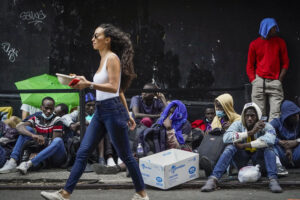Mutual Aid Organizers in NYC Save Asylum-Seekers As The City Fails Them
As record numbers of migrants seek aid in the city, they are increasingly turning to the Black and Arab Migrant Solidarity Alliance for help. LGBT Solidarity Rally in front of the Stonewall Inn in solidarity with asylum seekers by LGBT Solidarity Rally
via Wikimedia Commons / CC BY-SA 3.0
LGBT Solidarity Rally in front of the Stonewall Inn in solidarity with asylum seekers by LGBT Solidarity Rally
via Wikimedia Commons / CC BY-SA 3.0
In New York City’s sweltering heat, Bushwick City Farms is an oasis of shade and community. Friends of the farm tend vegetable patches while a father pushes a little girl gleefully riding an old toy car. The farm smells of fresh barbecue as a volunteer grills halal meat donated earlier that day. The farm is one of the few remaining public spaces in the historically Black community. Now, as the city grapples with record numbers of asylum-seekers, migrants are turning to the Black and Arab Migrant Solidarity Alliance (BAMSA), a mutual aid group that formed to support migrants at the farm.
“The situation is worse than what you imagine,” said Ely, a 21-year-old asylum-seeker from Mauritania who only shared his first name due to immigration concerns. “I have been here for two weeks, and I have not taken a shower. Now I smell, and there’s nothing I can do.”
Ely is one of approximately 500 men housed at a respite site that the city recently opened to serve as temporary housing in Brooklyn’s Bushwick neighborhood. Soon after the respite center opened on June 29, Documented reported that it lacked showers, enough bathrooms, and consistent air conditioning. Residents told Prism there are no showers, and they still struggle with limited bathroom capacity. As the city fails to provide asylum-seekers and migrants with basic amenities, mutual aid organizers are stepping in to fill in the gaps.
Migrants are confronting New York City’s longstanding housing crisis and a broken shelter system that struggles to provide paths to affordable housing.
New York City saw a sharp rise in migrants arriving last spring after Southern states like Texas bused thousands to Northern states with sanctuary cities as a political ploy led by Gov. Greg Abbott. The number of buses arriving daily has since decreased, but city officials state that 87,200 asylum-seekers have arrived since then. Many migrants have dealt with a lack of adequate heating and hot water in the winter, no privacy, the inability to obtain child care to work, and other deplorable conditions. Two asylum-seekers residing in city shelters died by suicide last year.
The Bushwick respite center is the latest facility with cramped cots, no privacy, and inhumane conditions. It was opened without functioning bathrooms, so the farms fundraised to rent portable bathrooms costing $400 a month. Prism spoke to MedRite staff who manage the respite site and claimed the showers would be fixed the following day. As of publication, there are no showers.
MedRite staff said they reached an agreement with the nearby public pool where asylum-seekers could shower before opening hours. Volunteers accompanying individuals to the pool were turned away due to their lack of appropriate pool attire, so BAMSA has been collecting donations of flip-flops and men’s swimming trunks. Many local residents have opened up their homes to asylum-seekers so they can shower but are struggling to meet the need.
“At least they have community support [in Bushwick],” said Adama Bah, an immigration rights advocate and former asylum-seeker who has worked with migrants in other areas of the city unable to access basic amenities. “Even though it’s a little bit, trust me, it’s a lot based on what others have.”
Like many migrants, Ely had a long and dangerous journey to the U.S. He traveled via foot, bus, flight, and car.
“I used to dream of coming to New York, but now my big dream is to take a shower,” Ely said.
Migrants are confronting New York City’s longstanding housing crisis and a broken shelter system that struggles to provide paths to affordable housing. City law outlines basic standards of housing for shelters, but the Adams administration has found various loopholes to bypass those rules. Officials have placed migrants in hotels, shelters, Humanitarian Emergency Response and Relief Centers (HERRC), and respite centers. Shelters are legally required to have bathrooms and showers, whereas HERRC and respite centers are not because they fall outside of the mandate of existing laws regulating shelter conditions. During a June 21 City Council hearing, Councilmember Shahana Hanif called these centers a “shadow shelter system” enabling the city to evade the law, while the mayor’s office responded they cannot build shelters or HERRC at a pace that matches the demand.
Organizers argue that the city aims to keep asylum-seekers in these conditions to deter other migrants from coming to the city.
“Based on the conditions right now, and the shelter conditions, that’s telling me you’re trying to deter people from coming here,” said Salim Drammeh, the president of the Gambian Youth Organization, which is based in the Bronx.
City policy says residents at respite centers should be transferred to other spaces, but organizers have seen individuals moved from hotels back to respite centers. Sergio Uzurin of NYC ICE Watch has worked with migrants who were moved from one hotel to another and most recently relocated to the respite center in Bushwick. The group organizes mutual aid events on a shoestring budget like medical pop-ups so migrants can see a doctor. They also organize “chill outs” where migrants can relax and eat together.
“We had one in the fall, and some of the migrants told us that it was the first time they felt like anyone had treated them like a human being,” Uzurin said. “It’s not just Republicans or Democrats but even the charities who have been involved in this process.”
In addition to housing, migrants face barriers accessing immigration attorneys, changing their official address and alerting immigration authorities, and finding a job while understanding local laws. Black migrants, especially Muslims, face unique cultural and language needs. Numerous mutual aid organizers cited language access as a major barrier for Black migrants and said there is a need for services in Wolof, French, and Arabic.
“I know a lot of them who have been jumping the turnstile, and we told them to stop doing it,” said Dr. Seydi Sarr, founder of the African Bureau for Immigration and Social Affairs. Sarr works with migrants who must travel to access resources or search for a job. He said many do not understand the risks and that an arrest for even a low-level crime could possibly lead to deportation.
Organizers were baffled by the needs of asylum-seekers in light of the multi-million dollar contracts the city has signed with nonprofit organizations to assist them. Mayor Eric Adams estimates the city will spend $1.4 billion on migrants this year, which the mayor described as “unfair” because of other ways the money could have been spent.
Bah is urging the city to fund groups on the ground supporting Black migrants.
She opened a resource center in Harlem where migrants can apply for government identification available to undocumented residents of New York City, food stamps, and an official change of address in addition to accessing a food pantry rooted in culturally sensitive practices and language accessibility.
For Ronnie James, the director of community engagement at UndocuBlack, it’s clear that providing resources for migrants benefits everyone. He points to Bah’s resource center as proof.
“[The center] is making things accessible to all people and not disqualifying anyone from accessing the same services that we all need,” he said.
Uzurin urges nonprofits to ask migrants what they want while acknowledging the challenges.
“This mayor seems very vindictive to people who criticize him,” he said. “It has led to a culture of larger nonprofits afraid to speak up even when they’re worked to the bone and owed money by the city. ”
The city announced this week that adult asylum-seekers who have been in the shelter system for a long time will be given 60-day notices to find alternative housing with the assistance of a caseworker.
City policies and the needs of migrants are constantly changing, forcing mutual aid organizers to adapt. Earlier this month, the city suddenly stopped offering migrants free transportation from Port Authority, where the buses drop them off, to a resource and check-in center nearly a mile away. Instead, migrants, many of whom have young children, are expected to follow a map to find their way and walk nearly a mile in midtown Manhattan. After coordinating with Bah, the Gambian Youth Organization is now planning on returning to Port Authority to assist migrants in reaching the resource center. The city says it is trying to cut costs.
The city announced this week that adult asylum-seekers who have been in the shelter system for a long time will be given 60-day notices to find alternative housing with the assistance of a caseworker. If they are unable to find alternative housing in a city with an affordable housing crisis, they must reapply for a new shelter placement. The city says it is trying to make space for families with children in need of shelter. Melissa Johnson, an organizer with the Black Alliance for Just Immigration, said the new announcement made her “profoundly concerned about a future of dignity and care.”
“The city’s framing pits vulnerable groups against each other,” says Johnson, emphasizing that this is not a them-versus-us issue. “Do we choose to be a society in which we care for all vulnerable folks? Or do we turn our backs on folks in their greatest time of need? Who are we as a community, as a city, and as a society?
Your support matters…Independent journalism is under threat and overshadowed by heavily funded mainstream media.
You can help level the playing field. Become a member.
Your tax-deductible contribution keeps us digging beneath the headlines to give you thought-provoking, investigative reporting and analysis that unearths what's really happening- without compromise.
Give today to support our courageous, independent journalists.




You need to be a supporter to comment.
There are currently no responses to this article.
Be the first to respond.